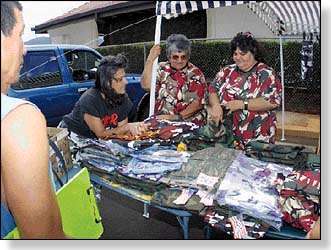Open market offers many affordable goods
Yesterday’s swap meet at the Kukui Grove pavilion in Lihu’e was the dream of any Kaua’i bargain hunters: A discount retail store, hardware store and vegetable market rolled into one.
Up to ten vendors laid out goods – some no longer made – that included dinner plates, drinking glasses, clothes and shoes from the 1960s, tools, weights, aloha shirts and shorts, military fatigues, leis and fruits.
Shoppers had their chance at buying choice goods: A Ni’ihau shell necklace for $600, a Kaua’i-made ukulele for $400, Japanese fishing floats, which are out of production, ranging from $200 to $300, and a 1960s percolator for under $10.
At a time when the economy has been made uncertain by the Sept. 11 terrorist attack, resulting in a drop-off in visitors to the state, the swap meet provided residents with a way to supplement their incomes, said Etang Pajarillo, coordinator of the event.
On busy days, vendors make an average of $40. Occasionally, they net as much as $100.
Kukui Grove Shopping Center has held the monthly swap meets since 1999. The initial turnout for the swap meet – about 40 people – was small, but more people came later.
Joy and Larry Simpson of Forth Worth, Texas found what they considered to be a deal: A black-laquered jewelry box for $2 and a green glass fishing float for $5.
“You never know what you are gong to find. We live in the deep south, and when we go up north, we stop by swap meets and find things from that area,” said Larry Simpson. ” What we are found here is inherent to this area. That’s fine.”
Dee Stilwell of Tucson, Ariz. walked away with a purchase that left her beaming: A namebrand bag for $1, something she said would have cost $20 new.
Tom and Melinda Burton of Sacramento, Ca., on their first visit to Hawai’i, choosing Kaua’i because it is less urbanized, said they wanted to start their day with a visit to the swap meet.
Melinda said she wanted to take in as much of the local culture before returning home and that the swap meet is a way to “see what locals are doing, rather than just staying at a hotel.”
Lihu’e resident Rudy Abara said the swap meet offered him the chance to buy new tools for his janitorial business and the repair of his boat and car.
“They got some good deals, but they haven’t got my money yet,” quipped Abara.
One of stands he stopped by belonged to Roger Olson of Lihu’e, who offered a wide array of tools, including hammers, scissors, cutters and an electrical chord.
Pajarillo and her mother, Mathilda Adams of ‘Ele’ele, who has been involved in swap meets or open markets for 20-plus years, had the largest offering of household goods. “This is the main way we make our living,” Pajarillo said.
For Eleanor Carvalho, a retired state employee who was accompanied by her husband, Daniel Carvalho, a retired operating supervisor with Hawaiian Dredging, said selling their wares at the swap meet “is the best thing for us to do on Saturday. We are retired.”
Eleanor Carvalho offered for sale a Ni’ihau shell necklace for $600, an ‘ukulele made by Henry Emura of Kekaha and rare floating fish floats from Japan.
Joan Slingerland and her daughter, Monica, of Kapa’a, said the swap meet was an ideal way to clear out items from their home that were no longer useful, including fish floats belong to her husband, aloha shirts and the jewelry box purchase by Texas visitor Joy Simpson.
The swap meet offered Lenny and Cookie Michelson, owners of Lenny’s On the Beach, a chance to showcase their goods.
The couple, who recently moved from Nevada to Kaua’i and now live in Po’ipu, offered for sale vitamin supplements that drew potential buyers.
Teri Silva of Teri’s Tropical in Lawa’i , who sold fruits, tropical flowers, macadamia nuts, toys and electronic equipment, said the swap was more than a way to make additional money for her family.
“I bring my children here so they can understand the struggles their parents go through to provide food, meals and money for them,” Silva said.




